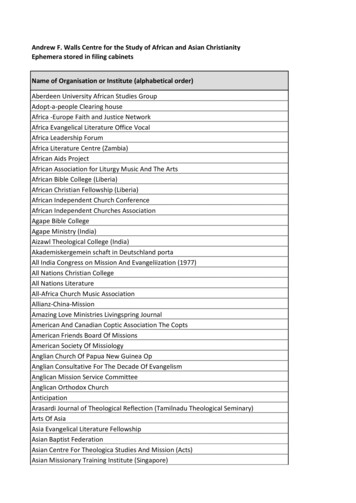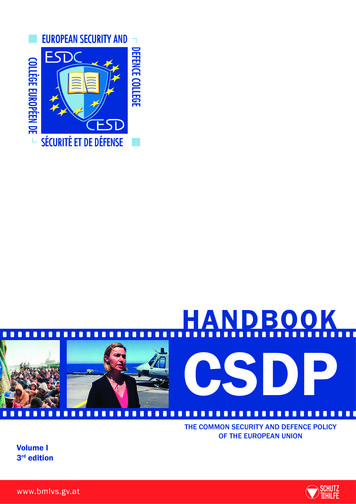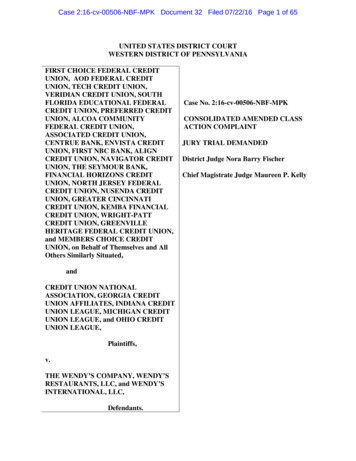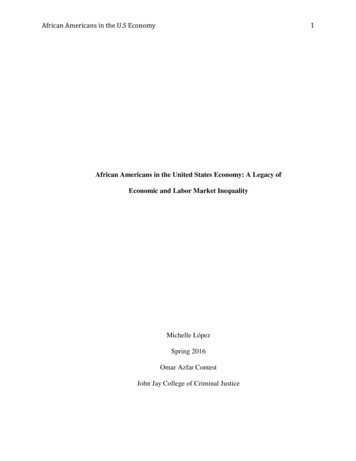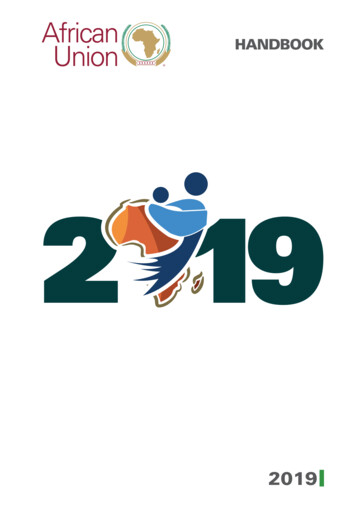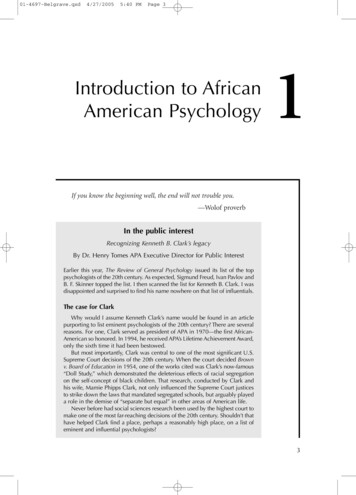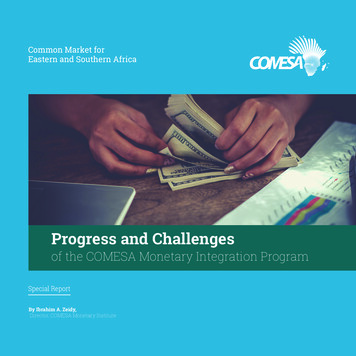
Transcription
United NationsEconomic andSocial CouncilAfrican UnionAfrican UnionE/ECA/ C OE/ 3 5/ 18AU/STC/FM EPI/ EXP/ 18(II)Distr.:Gen eral26 March 2016Original: EnglishEconomic Commission for AfricaCommi ttee of ExpertsThirty-fifth meetingAfrican UnionCommi ttee of ExpertsSecond meetingNinth Joint Annual Meetings of the African UnionSpecialized Technical Commi ttee on Finance, MonetaryAffairs, Economi c Planning and Integrati on and theEconomic Commission for Africa Conference of AfricanMinisters of Finance, Planning and Economi cDevelopmentMeeting of the Commi ttee of ExpertsAddis Ababa, 31 March – 2 April 2016Draft Pan-African Investment CodePreambleThe Member States,REAFFIRMING the Abuja Treaty establishing the African Economic Community and theadoption of Agenda 2063 by the Heads of State and Government;RECOGNIZING the need for a comprehensive instrument on investment applicable to allAfrican Union Member States;RECOGNIZING the growing importance of trade and investments for the growth anddevelopment of Africa;AFFIRMING the desire of Member States to promote an attractive investment climate andexpand trade and investments for long-term development;CONSIDERING the African Union objectives stated in the Constitutive Act aimed at fast tracking the political and socio-economic integration of the continent;RECOGNIZING that the vision for regional integration and development is to strengthenthe regional market, create wealth in Africa, and enhance competitiveness through increasedproduction, trade and investment flows in African countries;MINDFUL of the increasing importance of the development and strengthening of financialand capital markets, and the role played by investment and the private sector in productivecapacity, increased economic growth and sustainable development;DESIRING to promote within Member States an environment conducive to thedevelopment of a more vibrant and dynamic private sector that facilitates job creation,16-00512
E/ECA/COE/35/18AU/ST C/FMEPI/EXP/18(II)promotes technology transfer, supports long-term economic growth and contributeseffectively to the fight against poverty;RECOGNIZING that investment and trade based activities represent one of the majoravenues for illicit financial flows from Member States and that corrupt practices underpinthese outflows, Member States affirm their desire to promote corruption free investment andtrade regimes and improved laws and regulations that promote transparency andaccountability in governance;RECOGNIZING the right of Member States to regulate all the aspects relating toinvestments within their territories with a view to meeting national policy objectives and topromote sustainable development objectives;SEEKING to achieve an overall balance of the rights and obligations among Member Statesand the investors under this Code;MINDFUL of the crucial role played by women and youth in the development of Africa;RECALLING that the free movement of people is a fundamental pillar of Africanintegration;RECOGNIZING the role played by the New Economic Partnership for AfricanDevelopment (NEPAD) and the complementary existing regional and internationalinitiatives relating to a transformational economic agenda for Africa;DESIROUS of the need to ensure national and continental coherence in investmentpolicymaking;TAKING into account the various regional arrangements on investment across thecontinent;TAKING into account the Sustainable Development Goals (SDGs) and the Investment PolicyFramework for Sustainable Development of the United Nations Conference on Trade andDevelopment (UNCTAD);TAKING into account obligations of some of the Member States under relevantinternational instruments;DETERMINED therefore to execute and apply the Pan-African Investment Code(hereinafter, the Code).2
E/ECA/COE/35/18AU/ST C/FMEPI/EXP/18(II)THE MEMBER STATES HAVE AGREED AS FOLLOWS:CHAPTER 1GENERAL PROVISIONSArticle 1ObjectiveThe objective of this Code is to promote, facilitate and protect investments that foster thesustainable development of each Member State, and in particular the Member State wherethe investment is located.Article 2Scope1.This Code shall apply to Member States as well as investors and their investments inthe territory of Member States as defined by this Code.2.This Code defines the rights and obligations of Member States as well as investors, andprinciples prescribed therein.Article 3Relationship with other investment agreements1.This Code does not affect rights and obligations of Member States deriving from anyexisting investment agreement.2.Notwithstanding Paragraph 1, Member States may agree that this Code replaces theintra-African bilateral investment treaties (BITs) or investment chapters in intra-African tradeagreements after a period of time determined by the Member States or after the terminationperiod as set in the existing BITs and investment chapters in the trade agreements.3.Member States and Regional Economic Communities (RECs) shall take into accountas far as possible the provisions of this Code when entering into any new agreement with athird country in order to avoid any conflict between its present or future obligations under thisCode and its obligations in the other agreement.4.Member States may agree that in the case of a conflict between this Code and any intraAfrican BIT, investment chapter in any intra-African trade agreement, or regional investmentarrangements, this Code shall take precedence.Article 4DefinitionsIn this Code, unless the context otherwise requires:1.“Enterprise or company” means any entity duly constituted or otherwise incorporatedunder the applicable laws and regulations of a Member State provided that it maintainssubstantial business activity in the Member State in which it is located; substantial businessactivity requires an overall examination, on a case-by-case basis, of all the circumstances,including, inter alia: the amount of investment to be brought into the host State (i), the numberof jobs to be created (ii), its effect on the local community (iii), and the length of time thebusiness has been in operation (iv);2.“Home State” means a Member State from where the investment or the investororiginates;3.“Host State” is the Member State where the investment is located;3
E/ECA/COE/35/18AU/ST C/FMEPI/EXP/18(II)4.“Investment” means an enterprise or a company, as defined under Paragraph 1, whichis established, acquired or expanded by an investor, including through the constitution,maintenance or acquisition of shares, debentures or other ownership instruments of such anenterprise, provided that the enterprise or company is established or acquired in accordancewith the laws of the host State; An enterprise or company may possess assets such as:a) Shares, stocks, debentures and other equity instruments of the enterprise oranother enterprise;b) A debt security of another enterprise;c)Loans to an enterprise;d) Movable or immovable property and other property rights such as mortgages,liens or pledges;e) Claims to money or to any performance under contract having a financial value ;f)Copyrights, know-how, goodwill and industrial property rights such as patents,trademarks, industrial designs and trade names, to the extent they are recognized under thelaw of the host State.For greater certainty, investment does not include:(i)(ii)(iii)Debt securities issued by a government or loans to a government;Portfolio investments;Claims to money that arise solely from commercial contracts for the sale ofgoods or services by a national or enterprise in the territory of a Member Stateto an enterprise in the territory of another Member State, or the extension ofcredit in connection with a commercial transaction, or any other claims tomoney that do not involve the kind of interests set out in Subparagraphs (a)through (f) above;(iv)Investments of a speculative nature;(v)(vi)Investments in any sector sensitive to its development or which would have anadverse impact on its economy;Commercial activities.In order to qualify as an investment under this Code, the investment must have the followingcharacteristics: the substantial business activity according to Paragraph 1, commitment ofcapital or other resources, the expectation of gain or profit, the assumption of risk, and asignificant contribution to the host State’s economic development.For avoidance of doubt, establishment, acquisition and expansion under this Code only applyto the post-establishment phase.5.“Investor” means any national, company or enterprise of a Member State or a national,company or enterprise from any other country that has invested or has made investments in aMember State.6.“List of scheduled investment sectors” means schedules of excluded sectors of MemberStates or any other list submitted by Member States where applicable;7.“Member State” means any Member State or Member States as defined in theConstitutive Act of the African Union;8.“Measures” include any legal, administrative, legislative, judicial or policy decisionthat is taken by the host State, relating to and affecting an investment in the host State;9.“National” means a natural person who is a citizen of any Member State;10.“Portfolio investment” refers to any investment where the investor owns less than 10per cent of shares in a company or through stock exchange, or otherwise does not give theportfolio investor the possibility to exercise effective management or influence on themanagement of the investment;4
E/ECA/COE/35/18AU/ST C/FMEPI/EXP/18(II)11.“Public official” means any person selected, appointed or elected who performs publicfunctions on a permanent or temporary basis. This includes persons who work for an organ ofthe State or an organ of the central Government or an organ of a territorial unit of the State atthe national, regional or local level.12.“State contract” means a contract entered into between a Member State or an organ ofthe central government or a territorial unit of a Member State, on one hand, and an investoron the other hand;13.“Third country” means a State which is not a Member of the African Union.CHAPTER 2STANDARDS OF TREATMENT OF INVESTORS ANDINVESTMENTSArticle 5Admission and Establishment1.Each Member State shall promote, encourage and facilitate investments in its territory,and admit such investments in accordance with its laws and regulations.2.Each Member State shall accord investors rights of entry and establishment, inaccordance with its laws and regulations with the aim of promoting free flows of investmentwithin the region.Article 6Encouragement and support of investments1.Member States may introduce incentives in order to attract investments. Suchincentives may include inter alia:(a) Financial incentives in the forms of investment insurance, grants or loans atconcessionary rates;(b)Fiscal incentives such as tax holidays, pioneer status and reduced tax rates;(c)Subsidized infrastructure or services, market preferences;(d) Development-oriented incentives, to encourage preferential markets schemesand specific investors within the region;(e)Incentives for technical assistance, technology transfer requirements; and(f)Investment guarantees .2.Member States may harmonize incentives for investments t h at are o f s t rat eg icin t eres t t o t h e Member States or as prescribed by relevant African Union bodies. M emb erSt at es may h armo n ize in cen t iv es in acco rd an ce wit h s t an d ard s t o b e p res crib edfro m t ime t o t ime b y relev an t A frican Un io n b o dies.Article 7Most-Favored-Nation Treatment1.Each Member State shall accord to investors of another Memb er State treatment no lessfavorable than it accords, in like circumstances, to investors of any other Member State orof a third country with respect to the management, conduct, operation, expansion, saleor other disposition of investment.5
E/ECA/COE/35/18AU/ST C/FMEPI/EXP/18(II)2.Each Member State shall accord to investments made by investors of anotherMember State treatment no less favorable than it accords, in like circumstances, toinvestments made by investors of any other Member State or of a third country withrespect to the management, conduct, operation, expansion, sale or other disposition ofinvestments.3.The concept of “in like circumstances” requires an overall examination, on a case bycase basis, of all the circumstances of an investment, including, among others:(a)Its effects on third persons and the local community;(b) Its effects on the local, regional or national environment, the health ofthepopulations,or on the global commons;(c)The sector in which the investor is active;(d)The aim of the measure in question;(e)The regulatory process generally applied in relation to a measure in question;(f)Company size, and(g) Other factors directly relating to the investment or investor in relation to themeasurein question.4.The examination referred to in this Paragraph shall not be limited to or be biased towardany one factor.5.For greater certainty, the “treatment”, referred to in Paragraphs 1 and 2, does notinclude dispute settlement procedures provided for in other treaties . Substantive obligations inother treaties, do not in themselves constitute “treatment,” and thus cannot give rise to a breachof this Article.Article 8Exceptions to Most-Favored-Nation Treatment1.Member States may adopt measures that derogate from the Most-Favored-Nationprinciple.2.Any regulatory measure taken by a Member State that is designed and applied toprotect or enhance legitimate public welfare objectives, such as p u b lic h ealt h , s afet yan d t h e en v iro n men t , d o es n o t co n s t it u t e a b reach o f the Most-Favored-Nationprinciple.3.The measures taken by reason of national security, public interest, public health orpublic morals are not considered as a "less favorable treatment", in the meaning of Article 7.4.The Most-Favored-Nation principle shall not apply to sectors excluded in aMember State’s List of scheduled investment sectors .5.The Most-Favored-Nation principle does not oblige a Member State to extend to theinvestors of another Member State or of a third country the benefit of any treatment, preferenceor privilege contained in:(a) The existing or future customs union, free trade area, common marketagreement or any international arrangement to which the investor's home State is not aParty, or(b) Any international agreement or domestic legislation relating wholly or mainlyto taxation.Article 9National Treatment1.A Member State shall accord to investors of another Member State treatment no lessfavorable than it accords, in like circumstances, to its own investors with respect to themanagement, conduct, operation, and sale or other disposition of investments.6
E/ECA/COE/35/18AU/ST C/FMEPI/EXP/18(II)2.A M e mb er St at e s h all acco rd t o in v es t men t s fro m an o t h er Member Statetreatment no less favorable than it accords, in like circumstances, to investments of itsown investors with respect to the management, conduct, operation, and sale or otherdisposition of investments.3.The concept of "in like circumstances" requires an overall examination, on a case by case basis, of all the circumstances of an investment, including , among others:(a)Its effects on third persons and the local community;(b ) Its effects on the local, regional or national environment, the health of thepopulations, or on the global commons;(c)The sector in which the investor is active;(d ) The aim of the measure in question;(e)The regulatory process generally applied in relation to a measure in question;(f)Company size; and(g) Other factors directly relating to the investment or investor in relation to themeasure in question.4.The examination referred to in this Paragraph shall not be limited to or be biased towardsany one of the factors.Article 10Exceptions to National Treatment1.Member States may adopt measures that derogate from the National Treatmentprinciple provided such measures are not arbitrary.2.Any regulatory measure taken by a Member State that is designed and applied to protector enhance legitimate public welfare objectives, such as national interests, public health, safetyand the environment, does not constitute a breach of the National Treatment principle.3.Member States may, in accordance with their respective domestic legislation, grantpreferential treatment to qualifying investments and investors in order to achieve nationaldevelopment objectives .4.A Member State reserves the right to deny an investor the benefits of this Code, andto grant special and differential treatment to any investor and investment in such cases, thoughnot limited to instances where:(a)The investor does not have substantial business activities in the Member State; or(b)The investor is engaged in activities inimical to the economic interest of MemberStates.5.A Member State may deny national treatment if advantages available within theMember State’s economy are made for the exclusive benefit of its own nationals within theframework of its national development programs or its List of scheduled investment sectorswhere applicable.6.The National Treatment principle does not apply:(a) To subsidies or grants provided to a government or a State enterprise, includinggovernment-supported loans, guarantees and insurance; or(b) To t axat io n measures aimed at ensuring the effective collection of taxes,except where this results in arbitrary discrimination.7.In accordance with national laws and regulations, Member States may accord morefavorable treatment to address the internal needs of designated disadvantaged persons, groupsor regions.8.The implementation of these exceptions shall not entitle any investor to compensationfor any competitive disadvantages they may suffer.7
E/ECA/COE/35/18AU/ST C/FMEPI/EXP/18(II)Article 11Expropriation and Compensation1.Investments in Member States shall not be nationalized, expropriated or subjected tomeasures having effect equivalent to nationalization or expropriation except if the followingconditions are met in a cumulative manner:(a)A public purpose related to the internal needs of that Member State;(b)On a non-discriminatory basis;(c)Against adequate compensation; and(d)Under due process of law.2.The investor affected shall have the right, under the laws of the Member Stateexpropriating, to prompt review, by a judicial or other independent authority of that MemberState, of its case and of the valuation of its investment in accordance with the procedureestablished by the laws of the Member State.3.A non-discriminatory measure of a Member State that is designed and applied to protector enhance legitimate public welfare objectives, such as public health, safety and theenvironment, does not constitute an indirect expropriation under this Code.4.This Article shall not apply to the issuance of compulsory licenses granted in relationto intellectual property rights, or to the revocation, limitation or creation of intellectualproperty rights, to the extent that such issuance, revocation, limitation or creation is consistentwith applicable international agreements on intellectual property.Article 12Determination of the value of compensation1.Adequate compensation shall normally be assessed in relation to the fair market valueof the expropriated investment immediately before the expropriation took place (“date ofexpropriation”) and shall not reflect any change in value occurring because the in tendedexpropriation had become known earlier. In no event shall the valuation date be moved to anyfuture date. The computation of the fair market value of the property shall exclude anyconsequential or exemplary losses or speculative or windfall profits claimed by the investor,including those relating to moral damages or loss of goodwill.2.Where appropriate, the assessment of adequate compensation shall be based on anequitable balance between the public interest and interest of th e investor affected, havingregard to all relevant circumstances and taking account of: the current and past use of theproperty, the history of its acquisition, the extent of previous profit made by the foreigninvestor through the investment, and the duration of the investment .3.If the compensation is not paid within six months from the date of its determination, itshall after that date attract simple interests at the normal commercial rate where applicable atthe national level of the host State.4.Any payment shall be made in a freely convertible currency.Article 13War and civil disturbanceInvestors who suffer within the territory of a Member State damage in relation to theirinvestments owing to the outbreak of hostilities or a state of national emergency such as,revolt, insurrection or riot, shall be accorded treatment no less favorable than that accordedto investors of such Member States or to investors of any third country, as regards to anymeasure to be taken by the concerned Member State including restitution, compensation orother valuable consideration.8
E/ECA/COE/35/18AU/ST C/FMEPI/EXP/18(II)Article 14General Exceptions1.This Code shall not prevent any Member State from adopting or enforcing measuresrelating to the protection of human, animal or plant life or health, or to the maintenance ofinternational peace and security, or to the protection of its national security interests, subjectto the requirement that these measures are not applied in a manner which would constitute ameans of arbitrary or unjustifiable discrimination between investors in like circumstances ora disguised restriction on investment flows.2.Member States shall not be required to change nor relax their appropriate level ofprotection of human, animal or plant life or health in pursuit or attraction of inv estments.3.Any interested Member State may request information on the reasons for the measurestaken under Paragraph 1. The Member State taking such measures shall respond to the requestfor information within three months.Article 15Transfer of FundsMember States shall subject to national laws permit all transfers relating to an investment tobe made freely and without delay. Such transfers may include:(a) Profits, capital gains, dividends, royalties, interests and other current incomeaccruing from an investment;(b)The proceeds of the total or partial liquidation of an investment;(c) The payments made pursuant to a loan agreement in connection with aninvestment;(d)License fees in relation to investment;(e)Payments in respect of technical assistance, technical service and management(f)Payments in connection with contracting projects;fees;(g) Earnings of nationals of a Member State who work in connection with aninvestment in the territory of the other Member State; and(h) Compensation, restitution, indemnification or other settlement pursuant to theinvestments.Article 16Exceptions to the transfer of funds1.A Member State shall apply restrictions on international transfers of funds andpayments for current transactions relating to investments made in its territory in accordancewith its taxation as well as financial laws and regulations.2.Exceptions to the transfer of funds are permitted under the following conditions:(a) Capital can only be transferred after a period of five years after full operationof the investment in a Member State unless its national legislation provides for morefavorable treatment; or(b) Proceeds of the investment can be transferred one year after the investmententered the territory of a Member State unless its national legislation provides for morefavorable treatment.3.A Member State may prevent a transfer in a non-discriminatory manner and inaccordance with its laws relating to:(a)creditors;Bankruptcy, insolvency or other legal proceedings to protect the rights of9
E/ECA/COE/35/18AU/ST C/FMEPI/EXP/18(II)(b)Criminal or administrative violations; or(c)Ensuring the satisfaction of judgments in adjudicatory proceedings.4.A Member State may adopt or maintain measures not conforming with its obligationsrelating to cross-border capital transactions:(a) In the event of serious balance-of-payments and external financial difficultiesor threat thereof; or(b) In cases where, in exceptional circumstances, movements of capital cause orthreaten to cause serious difficulties for macroeconomic management, in particular,monetary and exchange rate policies.5.Measures shall be made public, be temporary and be eliminated as soon as conditionspermit.CHAPTER 3DEVELOPMENT-RELATED ISSUESArticle 17Performance Requirements1.Member States may support the development of local, regional and continentalindustries that provide, inter alia, up-stream and down-stream linkages and have a favorableimpact on attracting investments and generating increased employment in Member States.2.Member States may introduce performance requirements to promote domesticinvestments and local content. Measures covered by this Paragraph include, inter alia:(a) Measures to grant preferential treatment to any enterprise so qualifying under thedomestic law of a Member State in order to achieve national or sub-national regionaldevelopmentgoals;(b)Measures to support the development of local entrepreneurs;(c) Measures to enhance productive capacity, increase employment, increase humanresource capacity and training, research and development including of new technologies,technology transfer, innovation and other benefits of investment through the use of specifiedrequirements on investors;(d) Measures to address historically based economic disparities suffered by identifiableethnic or cultural groups due to discriminatory or oppressive measures againstsuch groups priortothe adoption of this Code.Article 18Lists of scheduled investment sectors1.The process of harmonizing the investment regimes among Member States takes placewith due respect for national policy objectives and the level of development of individualMembers States. There shall be appropriate flexibility for Member States to prescribe theirnational List of scheduled investment sectors open for liberalization, in line with theirdevelopment situation.2.Any Member State may also, within its List of scheduled investment sectors, use furtherclassification into subsectors and/or decide segments of sectors to better inform on the scopeof its commitments under this Code.3.Any Member State may submit a List of scheduled investment sectors that are excludedfrom the National Treatment principle where applicable.4.The Lists of scheduled of investment sectors form integral part of this Code andMember States agree to respect them.10
E/ECA/COE/35/18AU/ST C/FMEPI/EXP/18(II)CHAPTER 4INVESTORS OBLIGATIONSArticle 19Framework for corporate governance1.Investments shall meet national and internationally accepted standards of corporategovernance for the sector involved, in particular for transparency and accounting practices.2.In this regard, Member States, p u b lic b o d ies an d co mp an ie s are en co u rag ed t oimprove the legal, institutional and regulatory framework for corporate governance andany other issues such as environmental or ethical concerns.3.Investors shall:(a) Ensure the equitable treatment of all shareholders, in accordance withnational laws;(b) Encourage active co-operation between corporations and stakeholders increating wealth, jobs and the sustainability of financially sound enterprises ;(c) Ensure that timely and accurate disclosure is made on all material mattersregarding a corporation, including the financial situation, performance, ownership, andgovernance of the company, risks related to environmental liabilities, and any othermatters in accordance with the relevant regulations and requirements;(d) Pro v id e in fo rmat io n relat in g t o h u man res o u rce p o licies , s u ch asp ro g rams fo r human resource development.Article 20Socio-political obligations1.Investors shall adhere to socio-political obligations including, but not exclusively, thefollowing:(a) respect for national sovereignty and observance of domestic laws, regulationsand administrative practices;(b)Respect for socio-cultural values;(c)Non-interference in internal political affairs;(d)Non-interference in intergovernmental relations ; and(e)Respect for labor rights.2.Investors shall not influence the appointment of persons to public office or financepolitical parties.3.In v es t o rs s h all refrain fro m exercis in g restrictive practices and from trying toachieve gains through unlawful means.Article 21Bribery1.Investors shall not offer, promise or give any unlawful or undue pecuniary or otheradvantage or present, whether directly or through intermediaries, to a public official of aMember State, or to a member of an official's family or business associate or other personin order that the official or third country act or refrain from acting in relation to theperformance of official duties.2.Investors shall also not aid or abet a conspiracy to commit or authorize acts ofbribery.11
E/ECA/COE/35/18AU/ST C/FMEPI/EXP/18(II)Article 22Corporate Social Responsibility1.Investors shall abide by the laws, regulations, administrative guidelines and policies ofthe host State.2.Investors shall in pursuit of their economic objectives, ensure that they do not conflictwith the social and economic development objectives of host States and shall be sensitive tosuch objectives.3.Investors shall contribute to the economic, social and environmental progress with aview to achieving sustainable development of host States.Article 23Obligations as to the use of natural resources1.Investors shall not exploit or use local natural resources to the detriment of the rightsand interests of the host State.2.Investors shall respect rights of local populations, and avo id land grabbing practices vis-àvis local communities.Article 24Business Ethics and Human rightsThe following principles should govern compliance by investors with business ethics andhuman rights:(a)Support and respect the prote
enterprise, provided that the enterprise or company is established or acquired in accordance with the laws of the host State; An enterprise or company may possess assets such as: a) Shares, stocks, debentures and other equity instruments of the enterprise or another enterprise; b) A debt security of another enterprise;
